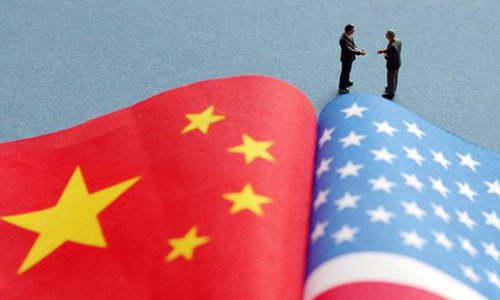HOME >> SOURCE
Lackluster global economy calling for a China-US trade deal
Source:Global Times Published: 2019/12/17 22:12:48

Chinese and US trade officials make attempt at striking a trade deal to defuse an increasingly bruising trade war that has rattled global markets and presented mounting challenges to both economies. Photo: VCG
After Chinese and US officials announced on Friday that they had agreed on the text of a phase one trade agreement, global stock markets rallied as investors cheered the thawing of the bitter trade fight that has dragged on global growth. However, there is also no shortage of noise, mostly from the US, where some appear single-mindedly focused on petty things about which side had won and which side had lost.The most notable criticism to the phase one trade agreement came from US President Donald Trump's political opponents in the US Congress. Shortly after news of the phase one deal on Friday, Chuck Schumer, the Democratic leader in the US Senate, accused Trump of having "sold out" for the interim deal.
Others in the US have also criticized the deal. On Monday, the renowned US economist Paul Krugman wrote in an opinion piece in the New York Times, asserting that Trump had achieved "almost none of its goals" in the phase one deal and that the deal made the US "weak."
While details about the phase one deal remain scarce as the two sides continue to review and translate the text, one thing should be clear: the deal is acceptable for both sides and is conducive to the Chinese and US economies as well as the global economy - the market rally following the announcement should be sufficient proof for this.
While the intentions of these critics of the phase one deal are unclear, as their intentions could be rooted in the chaotic US domestic politics or pure ignorance of the deal, it is clear that they ignored the positive impact of the deal and the de-escalation of the 19-month trade war expected to ensue on the global economy, or even the US economy.
Trade tensions have been cited as the chief factors used by global organizations, such as the IMF and the WTO, as they downgraded the outlook for the global economy and trade.
China and the US are the world's largest trading nations and bilateral negotiations will affect the future of global trade. It is imperative for China and the US to promote global trade through cooperation and add energy to the still lethargic world economy.
Trade tensions have repeatedly been cited as a major factor in the grim outlooks for the world economy and global trade.
In October, the IMF estimated that the trade war could cost the world economy $700 billion, or 0.8 percent in GDP growth, in 2020. The WTO also in October lowered its projections for global trade growth to 2.7 percent from 3 percent in April because of the trade frictions.
As limited as the phase one deal may be, it's a start of the de-escalation process and the remedial process to minimize the expected damage to the global growth. Conversely, the lack of the announced phase one deal would further throw the global economy into disarray and prompt a wave of stock selloff worldwide.
So far, US officials, including Trump, appear unfazed in face of the criticism. The US president on Friday struck back at Schumer for "sniping at our great new deal with China." US Treasury Secretary Steven Mnuchin also said on Saturday that the phase one deal is "very good" for global economic growth.
On the Chinese side, things appear to be moving forward. Chinese Foreign Ministry Spokesperson Geng Shuang said on Monday that the two sides are still going through the necessary procedures including legal reviewing and translation proofreading, after which they will decide on the location, time and format for the signing of the deal.
For the sake of the Chinese and US economies as well as the global economy, China and the US should ignore noise and expedite the process for the phase one deal lest undue delay may result in hitches.
Posted in: GT VOICE